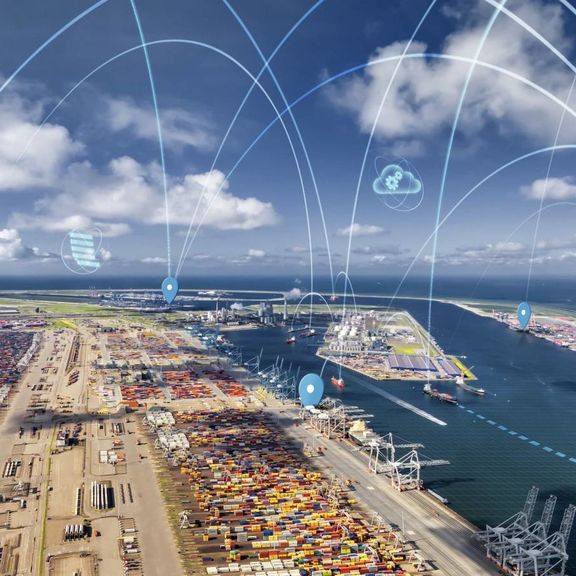Competitive position
Digitalisation projects that mainly focus on improving logistics processes in the port can be considered a direct investment in Rotterdam’s competitive position and the added value it can offer its users. The Port Authority has adopted a number of initiatives in this area, including:
- Routescanner: With Routescanner.com, cargo owners worldwide get a more complete insight into the possible door-to-door connections for containers via seaports, inland ports, rail and road connections. Ports thus become part of transparent, digital transport chains. In the summer of 2022, shortly after going live, Routescanner already counted some 6,000 unique visitors per month straight away. And about 150 operators shared directly their sailing and road schedules on the platform. All inland, rail and shortsea operators in Northwest Europe are connected, as well as some global shipping companies. The platform has the ambition to grow into the global, neutral place where container routes are displayed.
- PortXchange: PortXchange: Shipping companies, agents, terminals and other service providers can use this application for the optimal planning, execution and monitoring of all activities associated with a port call, based on the standardised exchange of data. Sharing planned, expected and realised times allows participants to reduce their turn-around times during port calls, improve capacity utilisation at the terminal and step up service thanks to increased predictability.
- Nextlogic: This digital planning tool helps to improve the handling of inland container shipping in Rotterdam’s port area. The participating terminals, barge operators and empty depots share up-to-date information about rotations, container locatio ns and quay capacity with the platform. The central planning tool BREIN subsequently optimises the associated planning. This reduces the need for coordination, shortens waiting times and results in fewer peak hours, ‘phantom containers’ and no-shows. And this in turn improves inland shipping’s reliability and competitive edge as a transport option.
- Ontrack: This application provides real-time insight into rail freight movements in the port of Rotterdam and its handling at the terminals. As such, Ontrack caters to a need on the part of the terminals and transport firms for data that can be used to draw up more efficient plannings and anticipate deviations.
- Riverguide: This app was developed for inland shipping and pleasure craft. It offers up-to-date information about aspects like routes, berth availability, drinking water sources and car drop-off points. RiverGuide merges data supplied by Zeeland Seaports, Rijkswaterstaat, the Province of Zuid-Holland, the Province of Noord-Holland, the Port of Rotterdam Authority, Port of Moerdijk, Port of Amsterdam and Groningen Seaports and combines it into relevant nautical information for the users of the Netherlands’ waterways.
Innovation and digitalisation
The following projects are specifically relevant in terms of the application of disruptive technologies:
Naviporta: This open and neutral platform was developed by the Port of Rotterdam Authority, Samsung SDS and ABN-AMRO and is based on blockchain technology. The platform enables all participating parties within the physical and financial supply chain to exchange mutually validated data. This validation is done by means of a ‘notary’ function, which certifies the origin and integrity of the provided data. In addition, Naviporta serves as an ‘open marketplace’ where third parties can offer applications based on this validated data. Naviporta is intended to make the transport, tracking and financing of freight as easy as ordering a book online. In 2019, the first container from Korea that was shipped via Naviporta’s paperless, directly financed and door-to-door traceable process was delivered to Samsung SDS’s Tilburg warehouse via the port of Rotterdam. Following the success of this pilot project, the parties are currently preparing the launch of the platform, which is expected to go live in late 2020.
Drones: The port of Rotterdam already makes extensive use of drones in the inspection of systems that are difficult to reach by other means. But drones offer many other options besides – the transport of people or goods, for example. Together with various partners, the Port Authority is exploring the many possibilities to deploy drones in and around the port area. Carriers like Amazon, UPS and DHL are already experimenting with using drones for package deliveries. In the port area, this type of drone could be used to transport crucial cargo to ships. Spare parts or navigation equipment, for instance; or blood; or medicines. The first package delivery in the port of Rotterdam took place in May 2020, followed by further pilot projects.
